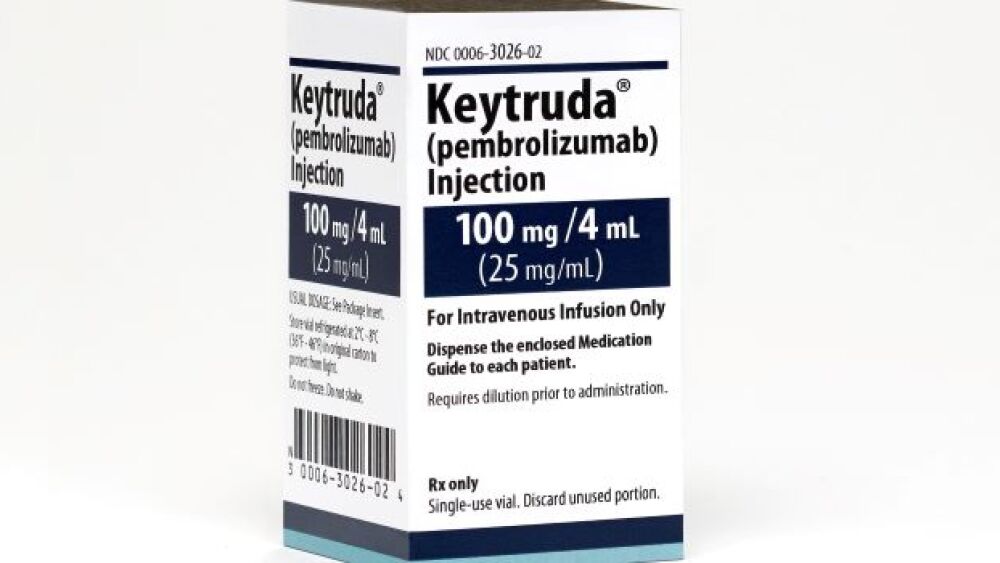Adding Yervoy to the therapy did not improve overall survival (OS) or progression-free survival (PFS) but did add toxicity to Keytruda monotherapy.
Copyright © 2009-2020 Merck Sharp & Dohme Corp., a subsidiary of Merck & Co., Inc., Kenilworth, N.J., U.S.A. All rights reserved.
Less than a year ago, Bristol Myers Squibb’s Yervoy received approval for previously untreated non-small cell lung cancer in a combination of Opdivo and Yervoy. Today, Merck released first-time data from the Phase III KEYNOTE-598 trial of Keytruda in combination with Yervoy (ipilimumab) compared to Keytruda alone as first-line therapy for metastatic non-small cell lung cancer (NSCLC) without EGFR or ALK genomic tumor aberrations and whose tumors express PD-L1. Adding Yervoy to the therapy did not improve overall survival (OS) or progression-free survival (PFS) but did add toxicity to Keytruda monotherapy.
In the study, median OS was 21.4 months in the Keytruda-Yervoy group compared to 21.9 months for the Keytruda only group. Also, the median PFS was 8.2 months in the combination cohort compared to 8.4 months for patients receiving Keytruda alone.
The trial enrolled 568 patients randomized 1:1 to receive Keytruda 200 mg intravenously on Day 1 of each three-week cycle for up to 35 cycles in combination with 1 mg/kg IV on Day 1 of each six-week cycle for up to 18 cycles of Yervoy, or Keytruda alone. There were no new safety signals for the Keytruda monotherapy arm, but in the combination arm, 76.2% reported treatment-related adverse events (TRAEs) compared to 68.3% of the Keytruda monotherapy arm. Of the TRAEs, 35.1% versus 19.6% were Grade 3-5, 27.7% versus 13.9% were serious, and 6.0% versus 3.2% led to discontinuation of Yervoy or placebo, and 19.1% versus 7.5% led to discontinuation of both drugs, while 2.5% versus 0.0% led to death.
There were also immune-mediated adverse events and infusion reactions in 44.7% of patients receiving the combination compared to 32.4% received Keytruda alone.
“In KEYNOTE-598, the addition of ipilimumab to Keytruda did not improve overall survival or progression-free survival, and patients who received the combination were more likely to experience serious side effects than those who received Keytruda monotherapy,” said Michael Boyer, chief clinical officer and conjoint chair of thoracic oncology, Chris O’Brien Lifehouse, Camperdown, NSW, Australia. “Keytruda monotherapy remains a standard of care for the first-line treatment of certain patients with metastatic non-small cell lung cancer whose tumors express PD-L1.”
So basically, adding Yervoy to Keytruda failed to extend the lives of first-line NSCLC patients whose tumors expressed PD-L1 at a proportion of at least 50%, while increasing the serious side effects.
It has been hypothesized that by adding a CTLA-4-targeted antibody to a PD-1 checkpoint inhibitor would create more benefits in some cancers, but this is the first well-designed comparison trial. And it completely undercuts the hypothesis.
“The results are clear,” said Roy Baynes, senior vice president and head of global clinical development, chief medical officer, Merck Research Laboratories. “The combination did not add clinical benefit but did add toxicity.”
The results were presented at the Presidential Symposium at the IASLC 2020 World Conference on Lung Cancer hosted by the International Association for the Study of Lung Cancer. The data was also published in the Journal of Clinical Oncology.
The trial was discontinued after a futility analysis by an independent Data Monitoring Committee (DMC), which declared the benefit/risk profile of the combination did not support continuing the trial.
Two primary forms of lung cancer are non-small cell and small cell. NSCLC is the most common type of lung cancer, making up about 85% of all lung cancer cases.
Sabine Maier, Bristol Myers Squibb’s head of oncology clinical development, noted that the benefit of the Opdivo-Yervoy combination “has been well established in Phase III trials across lung cancer, melanoma, renal cell carcinoma and mesothelioma” and those trials “clearly demonstrate that combining Yervoy and Opdivo can help patients achieve durable, long-term survival outcomes.”





